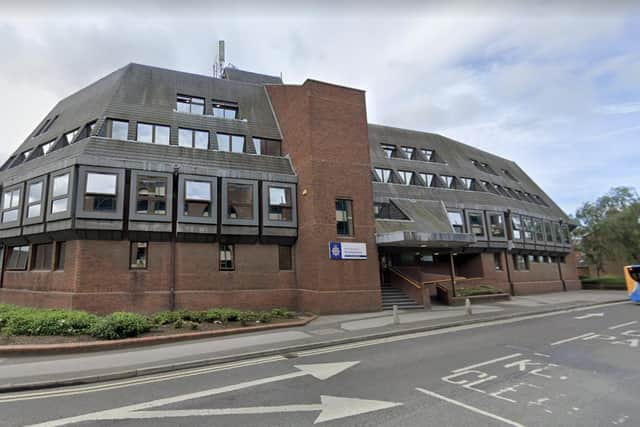Derbyshire man died after being restrained at Chesterfield Police Station following assault on officer, inquest hears
and live on Freeview channel 276
The inquest into the death Shaun Aherne, of Newboundmill Lane, Pleasley, concluded yesterday (Monday, February 6) at Chesterfield Coroners’ Court.
In his conclusion, Area Coroner Peter Nieto said that the 42-year-old was arrested by Derbyshire Police for assault and possession of cannabis on January 7 2018, and was taken to Chesterfield Police Station – where he was restrained after assaulting a police officer.
Advertisement
Hide AdAdvertisement
Hide AdMr Nieto said that Mr Aherne was then taken to the ground and restrained with barred handcuffs, velcro leg straps and a spit hood. He was carried face-down in the prone position by five officers, directly to a cell – which Mr Nieto said was “in order to reduce the time spent in restraints and disruption to the rest of the custody suite and other detainees.”


The coroner added: “Mr Aherne was restrained in the police cell due to continued forceful resistance and noncompliance. Cell extraction then began by the cutting off of his clothes, followed by removal of the restraints.
“Level 3 observations were started by the use of CCTV and visual monitoring through the cell door. Police custody staff re-entered the cell when Mr Aherne appeared unresponsive and it was confirmed he was unresponsive.
“The healthcare professional assessed Mr Aherne's condition and started CPR. An ambulance was called and on arrival paramedics continued offering additional medical support until Mr Aherne was in a stable enough condition to be transported to hospital.”
Advertisement
Hide AdAdvertisement
Hide AdOn arrival at Chesterfield Royal Hospital, Mr Aherne was admitted to intensive care and put on life support. He was monitored for three days before being pronounced dead on January 10 2018.
The coroner listed Mr Aherne’s cause of death as hypoxic/ischaemic brain injury. He added that cardiac arrest due to the physically and psychologically stressful incident, and ischaemic heart disease, had also contributed to Mr Aherne’s death.
Mr Nieto said: “The combination of Mr Aherne's coronary artery disease, intoxication, poor mental health, use of restraints, and the accumulated stress of the whole experience contributed to his death.
“It is apparent that police custody staff did not purposefully assess Mr Aherne's level of consciousness and vital signs before leaving him in the cell.
Advertisement
Hide AdAdvertisement
Hide Ad“It is believed that had they done so, it is possible that his deteriorating condition would have been recognised, and it is possible that interventions could have been provided to avoid his death.”
The coroner added that “the following significant issues, although not found to be directly contributory, are noted by the jury.
“The healthcare professional was not consulted for assessment or advice from arrival at custody until Mr Aherne was found unresponsive in his cell. The removal of Mr Aherne's clothing was unnecessary and unjustified.
“A custody sergeant did not separate from the restraint to oversee and direct the restraint and manage checks of Mr Aherne's vital signs and physical wellbeing.The custody sergeant did not specifically task a member of staff with constant and close observation of Mr Aherne following closure of the cell door.
Advertisement
Hide AdAdvertisement
Hide Ad“An inadequate level of checks were made on Mr Aherne's condition and level of consciousness after closure of the cell door, with ineffective efforts to rouse him.”
The coroner reached a narrative conclusion as to Mr Aherne’s death, stating: “Mr Aherne died due to the physical and psychological stress of being restrained in police custody because he had significant ischemic heart disease, which was not known at the time.
He was also under the influence of cannabis and likely poor mental health, which added to his level of physical and psychological stress. He went into cardiac arrest which interrupted the supply of oxygen and blood to his brain which caused unsurvivable brain damage.”